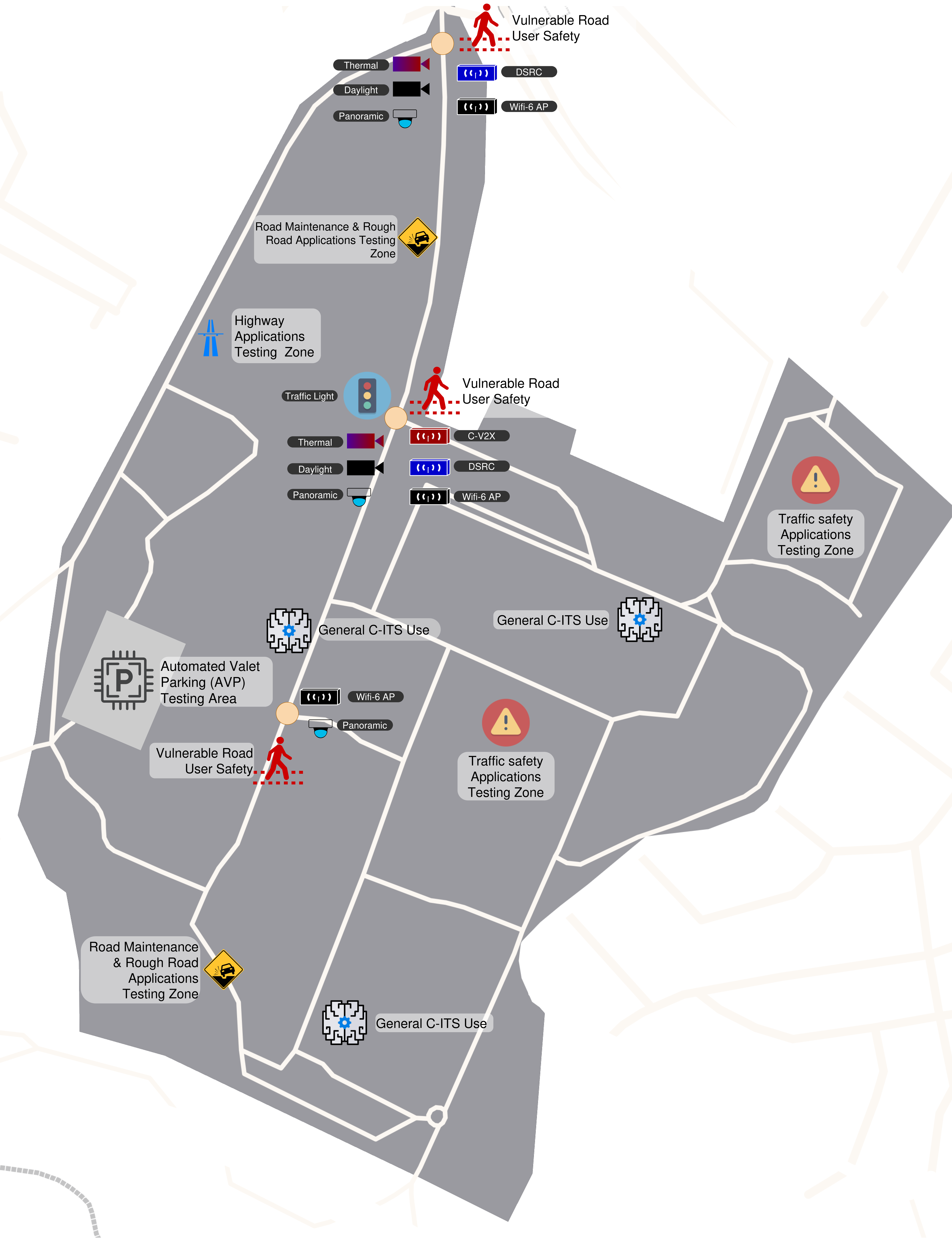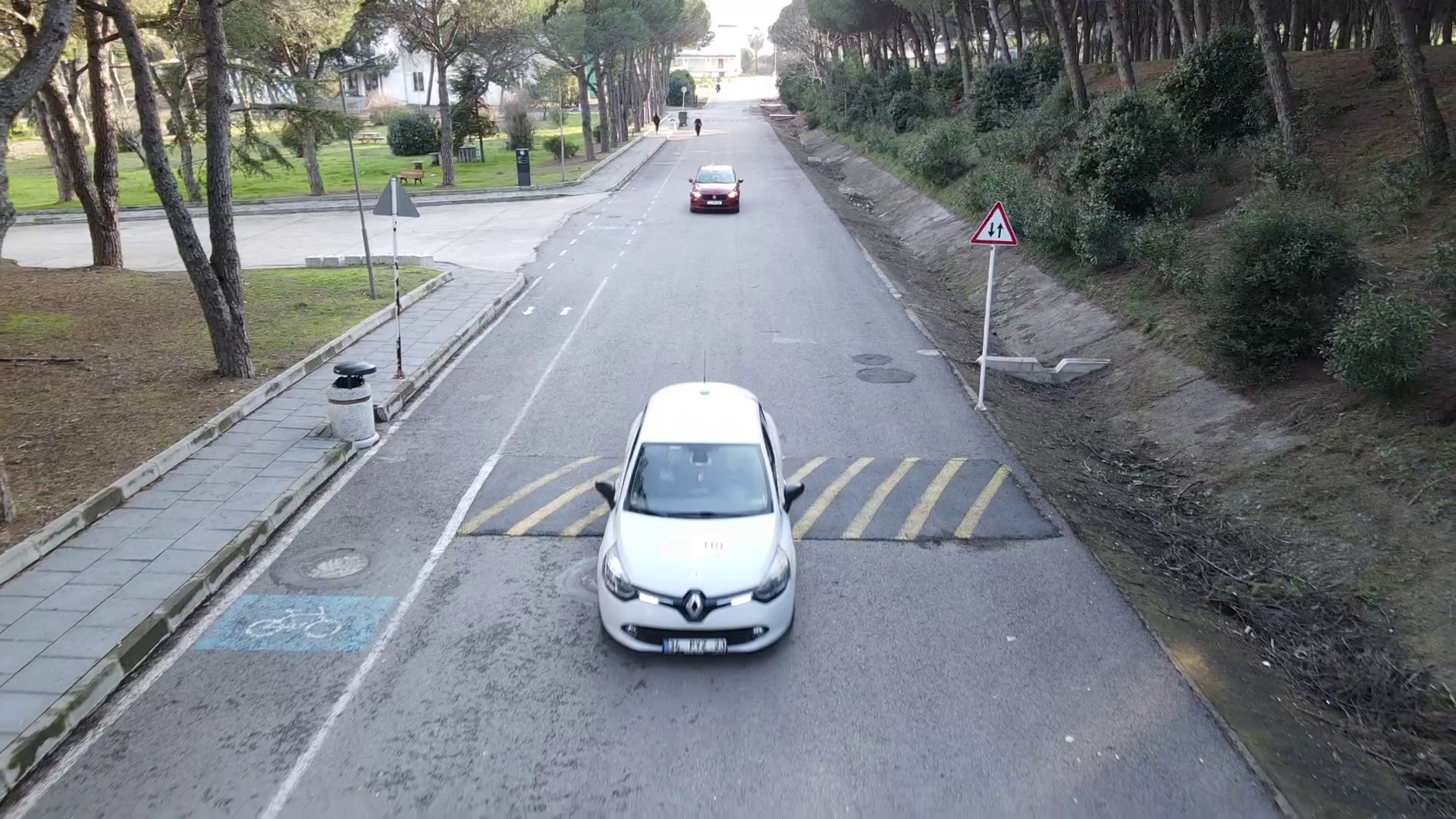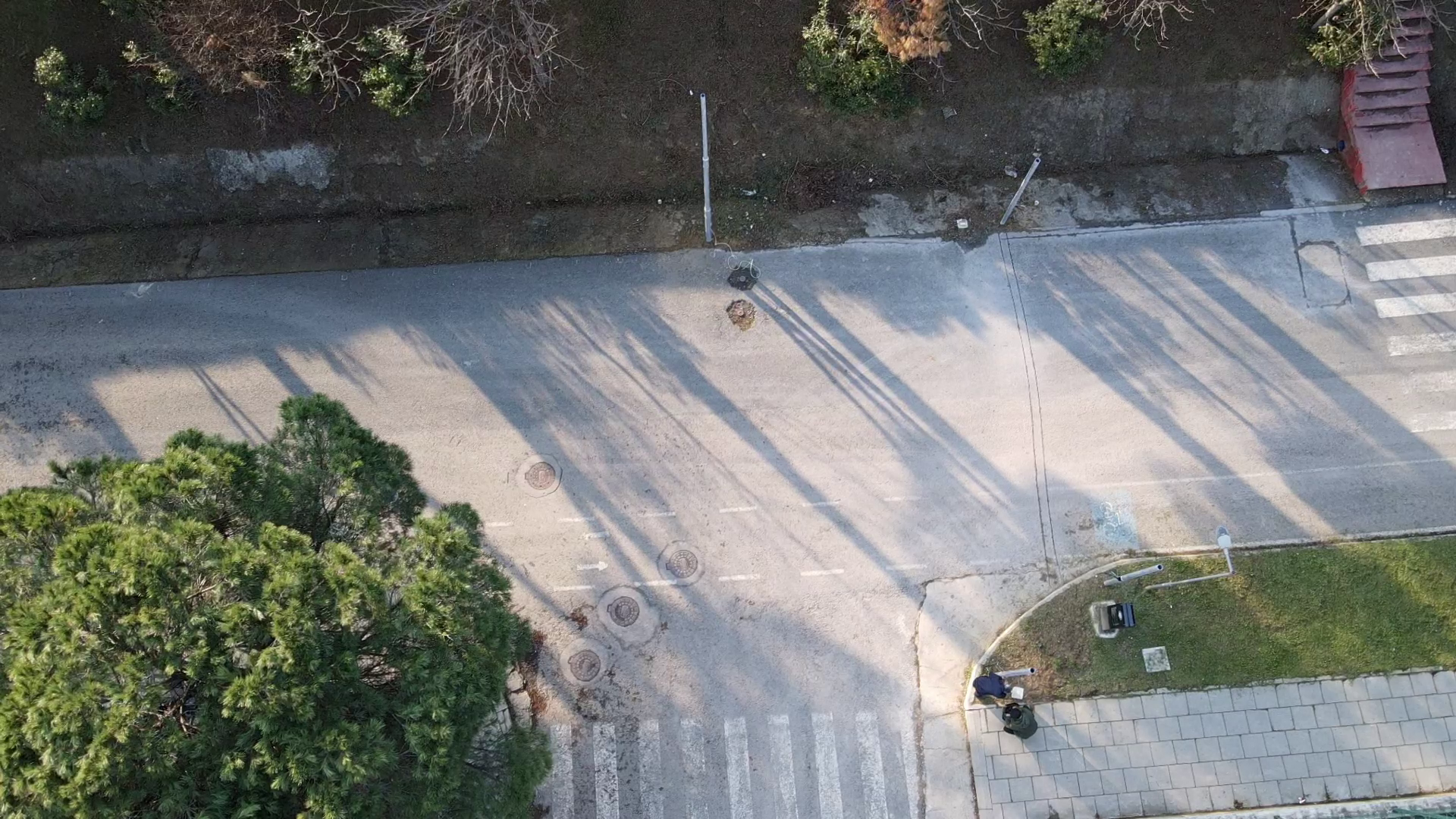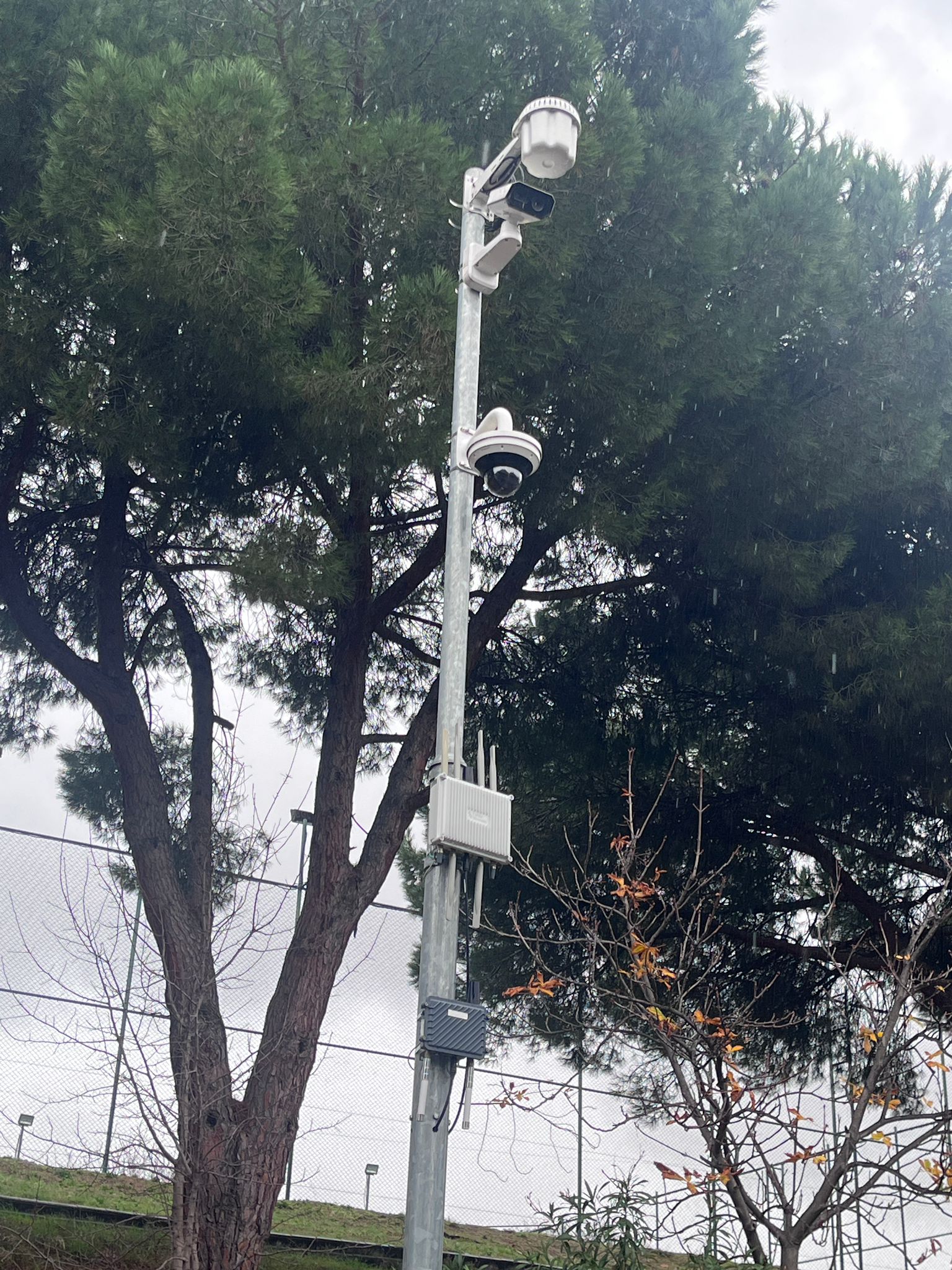VeST-AVe
VeNIT Lab Site of Testing for Autonomous Vehicles and C-ITS
Located in Kartal, Dragos Coast of Istanbul, the facility built and managed by Marmara University VeNIT Lab offers a highly capable proving ground for a wide range of autonomous mobility, and C-ITS (Cooperative and Intelligent Transportation Systems) use cases. Currently, the facility serves for a variety of Horizon Europe and National projects, and provides a testing ground for solutions of various companies from industry; as it enabled successful testing and demonstration of many solutions in the past.

Technical Capabilities
VeST-AVe features a versatile testing environment incorporating various road types with changing conditions, supported by advanced equipment and software tools for generating test scenarios. It facilitates comprehensive monitoring and analysis of test results while enabling deployment of diverse C-ITS services within the edge-cloud computing continuum, incorporating edge devices, GPU nodes, and cloud resources. The test and demonstration infrastructure currently facilitates the following equipment for enabling deployment of different use cases, applications, and services:
- DSRC Roadside Units (RSUs) and Onboard Units (OBUs)
- C-V2X RSUs and OBUs
- Autonomous driving test vehicle
- Teleoperation equipment
- Stationary 270° wide range, and standard FHD cameras
- Stationary infrared cameras
- Wi-Fi 6 access points
- Traffic lights with re-configurable controller
- Low-energy GPU nodes suitable for edge computing
- High-end GPU nodes suitable for cloud computing
- Fiber ethernet infrastructure
The equipment availability enables realizing a wide range of applications within a controlled environment for testing and demonstrations. Including:
- Large-scale testing/demonstration of C-ITS and autonomous vehicle scenarios, using virtually generated traffic, in a real-virtual world hybrid testing environment, powered by vTRIx
- Safety, security, and reliability testing of a wide range of autonomous and connected vehicle applications within real, virtual or hybrid testing environment
- Deployment and testing of services within edge-cloud computing continuum, with ability to demonstrate their interaction with real physical systems
- Development, testing, and demonstration of edge-cloud computing continuum management and orchestration software
- Deployment of traffic monitoring and management tools, and integrating with different signalization, electronic signage, and communication equipment. This is achieved thanks to the software stack that includes many advanced software such as CCEMP, and CCSP.
- Security and reliability testing of a variety of intelligent transportation systems’ services and infrastructure designs; such as topologies for interfacing control rooms with the existing infrastructure, or centralized signalization management.
- Testing of network topologies customized for different use cases, thanks to the high fidelity network monitoring ability powered by WATMON.



Zones
Different zones of VeST-AVe enable testing and demonstration of different applications, services, or hardware designed for different road conditions. As also illustrated in the given map, different zones and their ability can be described as follows:
- Road Maintenance and Rough Road Applications Testing: Designed to simulate challenging road conditions, including rough surfaces and potholes; it allows testing the resilience and adaptability of autonomous and connected vehicles, as well as the reliability of the hardware and effectiveness of algorithms designed for obstacle detection and navigation in adverse conditions. It further enables evaluating the solutions designed for road maintenance.
- Highway Applications Testing: This zone enables the evaluation of connected and autonomous vehicle systems designed for highways, such as tolling, cooperative adaptive cruise control (CACC), and lane-keeping assistance.
- Automated Valet Parking/Park Area Applications Testing: A dedicated space for testing and demonstrating automated valet parking solutions and park area navigation. This zone provides infrastructure to assess low-speed maneuvering, parking slot detection, vehicle-to-infrastructure (V2I) communication, and the integration of autonomous systems with parking management systems.
- Traffic Safety Applications Testing: Scenarios such as collision avoidance, emergency brake warning, and emergency vehicle prioritization can be tested in these zones. These zones are equipped to replicate urban intersections and other complex traffic scenarios to assess vehicle responses in real-world safety-critical situations.
- General C-ITS Use: Versatile areas for testing a broad range of Cooperative Intelligent Transportation System (C-ITS) applications. This includes deployment and evaluation of services such as traffic signal optimization, electronic signage integration, and vehicle-to-everything (V2X) communication for enabling reliable connectivity and cooperation among vehicles, infrastructure, and road users.
- Vulnerable Road User (VRU) Safety: Dedicated areas designed to test and evaluate applications and systems focused on the safety of VRUs such as pedestrians, cyclists, and motorcyclists. This zone includes crosswalks, bike lanes, and scenarios simulating interactions between VRUs and vehicles. It supports testing of pedestrian detection systems, blind-spot monitoring, collision avoidance technologies, and vehicle-to-pedestrian (V2P) communication to enhance VRU safety in various urban and suburban environments.
Reference Projects/Applications
- DECICE (Device-Edge-Cloud Intelligent Collaboration framEwork): VeST-AVe is used for validation of the resulting framework, within the C-ITS domain. VeST-AVe provides the environment to realize the computing continuum, deploy the DECICE framework, and demonstrate the framework’s abilities in real-time VRU safety applications with V2X communication.
- InSecTT (Intelligent Secure Trustable Things): Variety of V2X applications have been demonstrated and tested both in hybrid and physical testing environments. Real VUTs (vehicle-under-test) have been interfaced with virtual vehicles, using vTRIx, to generate a large-scale testbed.
- BRIGHTER (Breakthrough in micro-bolometer imaging): Intersection areas are used for generating Vulnerable Road User (VRU) safety scenarios for challenging the solutions based on microbolometer (infrared) imaging technologies that are being developed during the project.
-
Nationally funded R&D
projects: VeST-AVe is currently being utilized for
demonstrating many
nationally funded projects, which include:
- V2X applications/hardware testing
- Autonomous vehicle deployment
- Testing of network solutions for security and reliability
- Industrial partnerships: VeST-AVe is also used for demonstrating solutions of several companies operating in the field of intelligent transportation systems, autonomous vehicles, and information technologies.